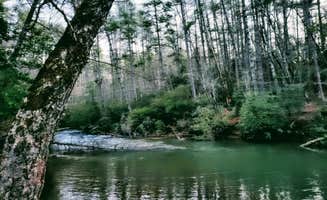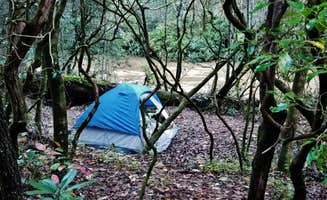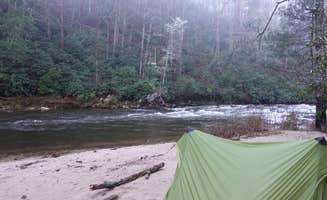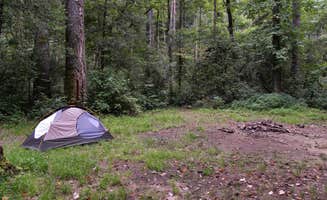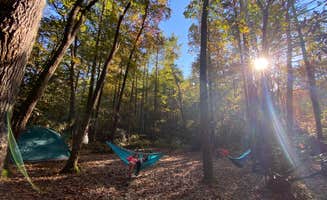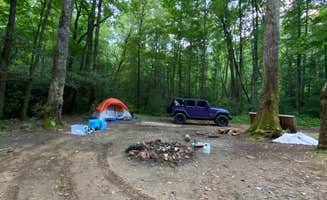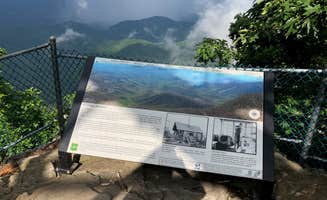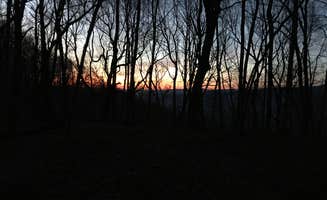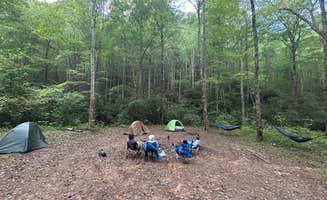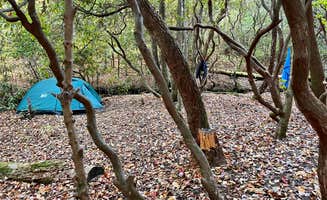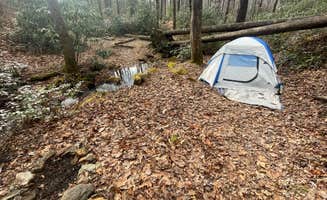Primitive camping near Walhalla, South Carolina centers around the Chauga River watershed and nearby creek systems within the Sumter National Forest. Elevation varies from 1,200 to 2,500 feet throughout the camping areas, creating distinct microclimates that affect camping conditions throughout the year. Winter temperatures frequently drop below freezing at higher elevations, while summer brings frequent afternoon thunderstorms that can rapidly alter forest road conditions.
What to do
Trout fishing year-round: The Chauga River and tributaries offer excellent fishing opportunities. At Earl's Ford dispersed, you can access prime fishing spots along the river with no size restrictions on catches.
Waterfall hiking: Several dispersed sites provide access to waterfall trails. Glen Falls Backcountry Campground connects to a strenuous trail with multiple viewing platforms. As one camper reports, "We hiked in from the trailhead that most people use to access the falls and continued down the trail past the typical turnaround point until you reach the bottom of the valley."
Creek exploration: Most dispersed sites feature creek access. Sandy Beach Campsite provides direct river frontage, as one visitor noted: "Right next to the Chattooga river. You're on the beach."
What campers like
Seclusion from crowds: Many sites offer significant privacy despite proximity to trails. At Falls Creek, campers appreciate the isolation. One reviewer mentioned: "There is room for two vehicles and multiple tent spots. Very secluded and fairly level. Overall a great spot."
Natural soundscapes: Rushing water creates a peaceful camping soundtrack. At King Creek, "There is a tributary of the Chatooga River within a few steps of the campsite, so you can hear the sounds of the creek all night long."
Fire rings at established sites: Most dispersed camping locations include established fire rings. At Blue Valley Dispersed Camping, "Some have picnic tables but all have fire rings and lantern posts. There's only about 10-15 sites that you can actually drive up to but I'm sure there's more if you hike in."
What you should know
Road conditions require planning: Forest roads deteriorate quickly after rain. At Mountain Rest Mountain Top, "The road is narrow and very bumpy. 4x4 recommended but I made it down in a 2x4 fullsize pickup."
Supply limitations: No services exist near most campsites. Pack in all necessities including drinking water, toilet paper, and food supplies. One camper at Blackwell Bridge noted: "There are not toilet facilities, water, lantern hangers, etc."
Unpredictable weather impacts: Summer thunderstorms and winter ice can trap vehicles. A Blackwell Bridge visitor reported: "I didn't get a chance to explore this camping area much because it was wet. I mean really wet! It is beside the Chauga River, and if you camp there after a storm like I did, expect a lot of wet puddles and soggy ground."
Tips for camping with families
Choose sites with established clearings: Some dispersed areas offer more level tent spaces than others. At Blackwell Bridge, "The camping site itself is open, with no designated tent sites, but there is a fire ring made of rock and a few stumps and rocks to sit on."
Consider traffic noise levels: Sites vary significantly in road proximity. At King Creek, "Unfortunately, the forest road was close enough that I could hear traffic passing by going to waterfalls and other areas. However, there is very little sound at night other than the creek."
Bring entertainment options: Limited cell service means technology-free camping. Blue Valley campers reported exploring the surroundings: "Wonderful creek/river by every campsite we went to."
Tips from RVers
Vehicle clearance requirements: Most forest roads require higher clearance vehicles. For Blue Valley Dispersed Camping, "From Highlands, follow NC 28 south about 5.5 miles and turn right onto Blue Valley Rd. (S.R. 1618) at the sign. The pavement will end in a half mile."
Size limitations: Small travel trailers and truck campers work best. Tent camping remains the primary accommodation option as large RVs cannot navigate most access roads.
Leveling challenges: Bring leveling blocks and chocks. Most sites lack level parking areas. At Falls Creek, a visitor noted the site was "fairly level" but this varies significantly between locations.


